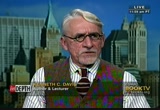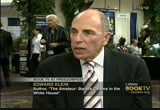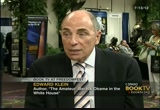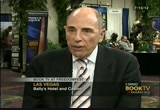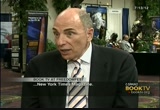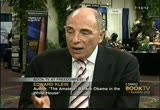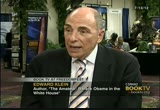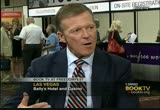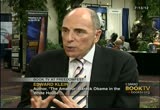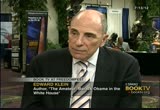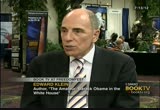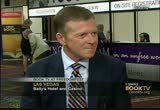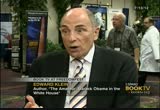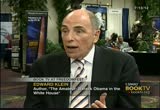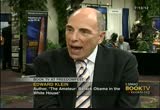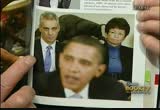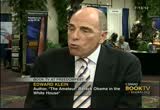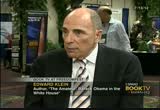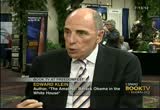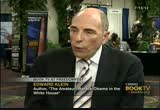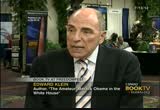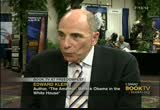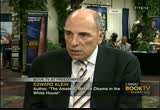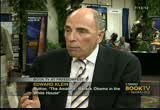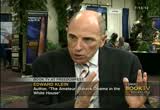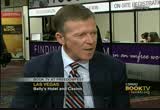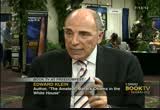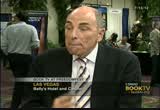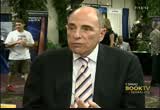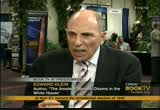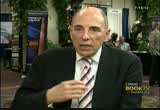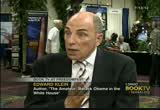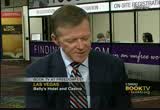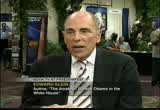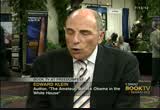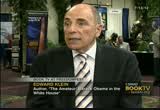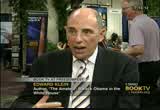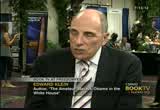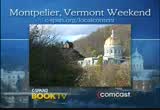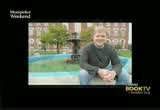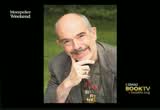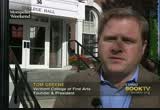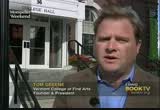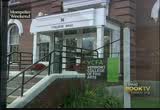tv Book TV CSPAN November 4, 2012 3:00pm-3:45pm EST
3:00 pm
america upside-down. what would happen if we looked at -- there's no reason we can look at it that way. north doesn't have to be a top. we could put south of the top who wanted to. >> host: we will have to leave it there. i apologize. out of time. kenneth davis has been our guest here on "in-depth". thank you very much. >> guest: thank you, peter. >> the presidential election is just around the corner. this weekend book tv has produced several political program from the past couple of weeks. the theme continues now. author edward klein joined book tv at freedom fest in las vegas to talk about his new york times best selling book, the amateur. helix critically at president obama before and after he reached the white house.
3:01 pm
here is what he had to say. >> well, the book currently on your screen is -- has been several weeks on the new york times best several with list. many weeks as number one. written by anne klein, who is our guest on book tv on c-span2. we do get the title for this book? >> it came from a meeting that bill clinton had in jeff pacoima, new york, north of new york city where he has a home. he invited, this was back in august 2011. he invited his wife, his daughter, and a bunch of friends to meet with him because he had some news. ..
3:02 pm
the people around obama: did not understand how the real world works. that they had been responsible for losing america, its triple-a credit rating for the first time in its history and that barack obama was, in his words, an amateur. i spoke to two people at the meeting, and i heard that, i said, amateur, the perfect titlele for the book. >> president clinton denied it. >> he denied it, but hillary told her friends she suspected that of all people, chelsea had told me about this. that's not true.
3:03 pm
never met chelsea clinton, but apparently chelsea has a reputation for texting her friends in the middle of meetings with her parent, but it was a confirmation that in fact this meeting did take place and it was an accurate representation of what went on during the meeting. >> also talked about chelsea clinton's reaction to the 2008 presidential primary on the democratic side. >> guest: well, chelsea, like bill, her father -- they're very close -- felt that the democratic nomination was practically stolen from her mother. that she deserved to be the presidential candidate, not barack obama, and the obama:s had unfairly characterized her father, bill clinton, as a racist during the campaign, and had played unfair with him. so he wanted her mother to get back and challenge obama: and
3:04 pm
run for president. >> host: aren't all presidents amateurs when they come into office? >> guest: i think most of them are. i don't think dwight eisenhower was. he understand how to be a manager, an executive, how to get things done. i don't think lyndon johnson was an amateur when he inherited the presidency after the asass anyway i think of lyndon johnson, who could not give a good speech, really, who did not speak well with the teleprompter, who understand how to manipulate the levers of power in washington. he understood human nature, understood the strength and weaknesses of the people in congress and how to play on those weaknesses and strengths. obama doesn't have that skill set to use human nature as a way of getting done what he wants to
3:05 pm
get done in washington. >> host: holm books have you written? >> guest: i think this is my 11th book. three novels and eight nonfiction. >> host: what do you say to critics of your books? >> guest: what do the critics say. >> host: the accuracy of the stories you tell, et cetera. >> guest: well, the fact of the matter is, as far as i know, there hasn't been a single fact in this book that's been challenged in a kind of credible way. people have said, oh, klein makes things up. that's what kids in the schoolyard -- they call each other names. i've been called all kinds of names. but in fact when it comes to the credibility of my reporting, i don't think anybody has laid a glove on me yet. >> host: how many university were you editor.
3:06 pm
>> guest: 12 years assed debtor in chief of "new york times." and many of my. columns have been used by vanity fair, and all the books that have been excerpted, not a single nonfactual issue was wrong. >> host: you interviewed -- >> guest: we sat down for three hours, across a -- not even across the table. just sitting the way you and i are sitting, with a tape recorder on a table, and it was an amazing experience because, first of all, exhibited him to be bomb bass stick, the way he was on the videos, with his -- raising his voice and denouncing
3:07 pm
america, white people, jus, none of that happened during our interview. he was very polite and courteous, low-key, speaking in a modulated voice. seemed quite intelligent to me. of course i don't agree with a lot of the things that he has been videotaped saying, but i must say that during these three hours i believed his stories, and he told me many very interesting stories. >> host: where is he now as far as his relationship with president obama? >> guest: well, he clearly feels bitter that he was thrown under the bus, as he sees it, by barack obama and the obama campaign during 2008. he felt he had a special relationship with obama, that went on for 23 years. it is a mistake to think that barack obama only knew jeremiah write through sitting in a pew
3:08 pm
in his church and listening to these sermons. in fact, barack obama and jeremiah wright had a one-on-one relationship in which they met for literally hundreds of times in the reverend wright0s home and at every step of obama's career, he went to the reverend wright for advice, counsel, political direction. so this was a relationship that was closer than any relationship in his life, with the possible exception of his relationship with his own wife, michelle obama. >> host: does he have any direct contact with the president? >> guest: no. no contact. after obama won the presidency, the reverend right told me that he sent him a note congratulating him on achieving his amibition, as he put it. and that he didn't expect a note
3:09 pm
to get to him directly so he gave it to a neighbor of obama, who the reverend wright now to hand-deliver it, and he doesn't know to this day whether that note was deliver. >> host: who is steve rogers who you also interview from chicago. >> guest: a professor at the kellogg school of management at northwestern university. >> host: what was his connection with president obama? >> guest: like many african-american businessmen and leaders, whom i interviewed, he was early -- he was an early backer and supporter of obama. after obama lost a congressional primary to bobby rush in 2000, rush is the former black panther
3:10 pm
but now congressman. he was deeply in debt. he went around looking for people to donate money to his cause. and steve rogers, very successful businessman at that time before he became a professor, gave him, i believe it was $6,000, to pay off some of his personal debts. in return, obama promised he would visit steve rogers' students, and if he won the u.s. senate seat, and speak to them. he did win the u.s. senate seat. rogers never heard from him so he called him up and he asked obama, would he come? and obam said, steve, i'm too busy. i'm getting phone calls from warren buffett and from steve jobs and bill gates and all these important people. and rogers said, you promised.
3:11 pm
and obama told him, well, you know, steve, you're not supposed to believe promises made by politicians, are you? and rogers got very angry. and demanded he show up. and eventually he did show up, obama. but the point of the story is that so many of the african-american leaders, businessmen and political people have spoken to for this book, told me similar stories in which they were there for him, for obama, on day one. they were what the call day-one people, supporting him, organizing for him, contributing to him, and that once he was elected to either the senate and then eventually to the presidency, they never heard again from him. there was a lack of gratitude. a lack of sense of obligation. and it wasn't only
3:12 pm
african-americans. it was also jewish american donors who gave them -- it was oprah winfrey who worked hard for him and was frozen out of the white house, and caroline kennedy and on and on. and here was a president -- a man who felt he deserved -- he was entitled to all this support and didn't owe anything back in return. >> host: ed klein, what about michelle obama? what is her role in the white house? i. >> host: i love that picture of michelle obama. she is a very attractive woman. she has been on the cover of many fashion magazines. in fact vogue had her on the cover with the headline, the first lady the world has been waiting for. michelle liked to tell the
3:13 pm
american public she has no interest in politics, that she doesn't like politics and doesn't want to get involved in politics. her main interest is in raising her children, taking care of her husband, doing some work for her antiobesity campaign, but my reporting turned up a very different profile of michelle obama. a woman who in fact grew up in a household where her father was a political operative of the daly man in chicago, who was actually weaned on politics as a child, who married obama, knowing of his political amibition, so she chose a politician to marry, and who has been his most important political partner at every step of his campaign, and every step of his presidency, and has enormous amount of influence in
3:14 pm
his decisionmaking process. >> host: throughout the presidency and earlier, we always heard that michelle obama did not want him to run for office necessarily, and she was the reluctant half. >> guest: we heard that story. it's a great story. it's a story of a woman who doesn't seem to have any amibition. either for herself or her husband, but in fact that's not the michelle obama that i found when i interviewed her close friends, people who knew her when, back in chicago days. people who now know her. michelle obama loved being first lady. she is a very, very intelligent, well-educated, well-spoken woman with great opinions -- strong
3:15 pm
opinions but who also has a reputation, earned, for liking the very comfortable lifestyle, and here in the white house she has people taking care of her every want and wish. she, as you know, has gone on many, many vacations, some of them quite controversial, to spain and to the ski slopes in the west of the united states. she spent at one point during a period of several months, 42 days on vacation. she is living the life of a very pampered woman, and apparently this fits with her personality. >> host: you write, whereas the clintons were open and aboveboard about their co-presidency, boasting hillary was an equal partner with bill, the own bamas have hidden the fact that michelle is one of his
3:16 pm
major advise you'res and he listens to her. >> guest: that's true. the way she does that is often through her very best friend. how she gets her opinions through. her very best friend, valerie jarrett. valerie jarrett is a woman who hired michelle many, many years ago, to work with her in mayor daly's administration in chicago. more importantly, valerie jarrett is the person who comes from a very well-off african-american family, with great connections to power sources all over chicago. she introduced barack and michelle obama to these power centers. african-american, well off business men, jewish american donors, daly political
3:17 pm
operatives and other sources of influence, and as a result she raised the obamas from really obscurity in chicago to a position in which they were now socializing and rubbing shoulders with the power centers, and it was these power centers that made it possible for obama to first become a united states senator and then the president of the united states. so, they owe a great deal to valerie. they treat her as though she is their godmother. she is now the senior advisor to both the first lady and the president of the united states, and obama himself has said, i run all my decisions through valerie, and i trust her implicitly. there's no one short of the president and the first lady, who has more power in the white house than valerie jarrett.
3:18 pm
>> host: you also write that trying to figure out jarrett's mysterious hold on the president and the first lady is a favorite guessing game in the parlors and dining rooms of washington. >> guest: it's strange. what is her source of power? after all, she doesn't have any foreign policy experience but she attends national security council meetings. she doesn't have any economic background but she is often in the most important domestic meetings regarding the economy. no one gets to see the president without first going through valerie jarrett. so what is this power she has? the only explanation i could come up with after all these interviews i did, was that she has given the first lady and the president the impression she has their back, she's protecting them from a hostile world, if you will, a world in which people can come to see the president and make proposals
3:19 pm
that would not be to his liking. so, for instance, when, as an example, when the president wanted to do a mandate requiring religious institutions to provide free medical -- i'm sorry -- health insurance for abortions and contraceptions, bill daly, the then chief of staff, brought archbishop dolan for new york, the catholic archbishop to speak to the president. when valerie -- because she was obviously opposed to this mandate as a catholic. when valerie jarrett heard about it she went ballistic because bill bailey, the chief of staff, hadn't asked her permission to allow dolan to see the president. so, suddenly her power and control was challenged. it was at that point that bailey
3:20 pm
started to lose his power in the white house and eventually he realized he cooperate -- couldn't get things done and resigned. >> host: what is or was valerie jarrett's relationship with rahm emanuel? >> guest: not a good one. to this day rahm emanuel does not have good things to say about jarrett. emanuel was opposed to the president's this is other people's reporting as well -- the president going for broke on obamacare. he thought he should do incremental steps first, small steps, popular steps he could get republican backing for. valerie jarrett and michelle obama were the two people who said, listen, mr. president -- actually, valerie calls him barack. the only person in the white house, other than michelle, who does. you were elected to be not just president but to be a special
3:21 pm
president, a transformational president, a person who is going to change the direction and course of america, and you can't just do this piecemeal. you have toking take the whole thing. good for the healthcare bill, to go down in history as the first president to pass a national healthcare bill, and he listened to valerie and michelle, not to rahm emanuel, and this was the beginning of emanuel's erosion of power, because it was one of several examples to which the president listened to the ideology of valerie jarrett, rather than the pragmatic advice of rahm emanuel. and ultimately rahm emanuel was forced out of the white house by michelle and valerie jarrett, and to this day he resents that. >> host: edward klein, are you a
3:22 pm
conservative? >> guest: i think i would describe myself as someone who is right of center. if that makes me conservative, i'm conservative. i'm sortly not a liberal. my training as a reporter is to let the facts speak for themselves. but i do have a sense that this country has been drifting in the wrong direction, and that is ought to be righted, if you will, using that word right in both senses of the word. >> host: have you politics changed over the years? should i -- >> guest: i think i've been a conservative or conservative leaning for quite some time. i don't think they've gotten any more conserve. on some social issues i'm actually quite libertarian and liberal. >> host: were you surprised by some of the findings in your book? >> guest: i tell you, the thing that surprised me the most in
3:23 pm
this book, i expected, in the many trips i took to chicago -- i live in new york and went to chicago many times -- i expected to find -- this may be my open prejudice -- that african-americans would unanimously tell me how much they loved barack obama because they're black and he is black and that's the way things are. but that's not what i found at all. what i found is among the leader office the african-american community, not the street but the leadership -- the people who are well-ode indicate, the people who have business interests. the people who are concerned about the direction of the country in a larger sense -- that to a man and a woman, they were displeased and disillusioned with barack obama. they point it out, for instance,
3:24 pm
that today, whereas the national average of unemployment is 8.2%, in the african-american community, it's 14.1%. and in some cities, like detroit, it's 18%. and in some areas, especially among african-american youth, it can be 30 and 40%. so it's a depression in the african-american community, not a recession. and they don't feel that barack obama has adequately addressed this in his economic policies have failed not only america at a whole but the african-american community in particular. >> host: from the amateur you write, by all can'ts obama was elected to a job for which he has little relish. he doesn't find joy in being president. like richard nixon and jimmy cart her, he is an introvert who prefers his own company to that of others. >> guest: yes.
3:25 pm
akind of a ironic that barack obama, in public, when he makes public appearances, comes across as a likeable, outgoing, upbeat, guy, and we can see again and again that his likeability quotient far outruns his polling numbers in job approval. so, he is still a liked person in public. but that is his performance we're talking about. as a public figure. in terms of his actual working in the governance, toward the governance of this country, again and again i learn from both republicans and democrats, that he doesn't have the skill set that a lyndon johnson had, for instance, who understood how to manipulate the levers of power in washington, or ronald reagan, who would get together at the end of the day with tip o'neill, the democratic speaker
3:26 pm
of the house have a drink with him. reminisce, tell jokes, and then start working out how to get a bill passed. barack obama doesn't seem to know how to do that. he in fact in private -- in private he is a very introverted person who doesn't reach out beyond a small group of chicago operatives who he has brought with him to the white house. >> host: tried to ignore the ominous change in tone coming from the obama transition team as barack obama's inauguration drew near, oprah's calls to michelle win unheard. instead oprah heard from the white house coordinator who told oprah she needed to talk to him first about the interview, and once more oprah had to run her questions past jeff stevens, a deputy speech writer, for prior approval. it was plain to oprah, oprah
3:27 pm
isn't a snob but doesn't like having to put up with mid-level clerks. >> guest: oprah expected that as a result of her role during the democratic primary, where he played -- she played a pivotal roll in helping obama: get the domination, and wresting it away from, she would be an important advisedder to president barack obama, and after he was elected president, oprah and obama spoke at some great length about her -- using her to advise him on his communications strategy, especially in terms of television, which he, of -- which she knows a lot about. when michelle and valerie jarrett heard about this, they felt that this was a threat to their control over the access to the president, and they didn't
3:28 pm
like that at all. so, when oprah offered to do an oprah winfrey show from the white house to launch michelle obama's anti-obesity campaign, michelle held a meeting in the east wing of the white house where the first lady has her office, and said, i don't want some rich, fat woman being the emblem of my antiobesity campaign. that got back to oprah. she found out about that. she was furious. she said michelle -- this was what she told her staff, and i interviewed her staff. she said michelle doesn't like rich people. michelle doesn't like fat people. she doesn't want me waddling around the white house, and she then washed her hands of the whole thing, and has announced she is not going to campaign in 2012 for barack obama. >> host: the role of jesse jackson in president president s
3:29 pm
early political career. >> guest: that's very up known. i was very fortunate in being able to find about that. jesse jackson is still a highly regarded figure in the african-american community in chicago. and when obama started running for the u.s. senate, he was advised to go to jackson and get some help from jackson regarding foreign policy issues, domestic policy issues, but even more important, his speaking -- his oratory needed some work and they thought jesse could help him. and jackson agreed to do so. and every saturday for a whole year, barack obama was invited to the push rainbow meeting that jackson held, where jackson worked with obama on his oratory and his delivery of speeches,
3:30 pm
and he improved tremendously. guess what? since he was elected president, president barack obama has not invited jesse jackson to the white house once. he is totally, completely cut himself off from jesse jackson. no one seems to know exactly why, except that it appears that it would -- that there would be a -- the object of jackson being in the white house might give a signal to white voters that obama is in jackson's corner politically. and apparently obama doesn't want to do that. >> host: you write: if karl rove was george w. bush's brians, then david axlerod is barack barack obama's homer. >> guest: is what? >> host: homer.
3:31 pm
>> guest: that's a pretty good line i wrote. he is his homer. >> host: what do you mean? >> guest: david axlerod is a brilliant creator of permanent stories for politician -- personal stories for politicians. so when barack obama ran in 2008, he didn't have a record to run on because he hadn't done anything. but he did have to run on was his personal story. the son of a black african and a white middle american mother. a man who sought his identity and found it. who was raised by these saintly grandparents and so forth and so on. this was a story because homer was known for talking about
3:32 pm
taking a trip and during the trip coming to some inner understanding of one's self. this was a story that david actle -- axlerod fashioned obama. but there is no story. we've seen that story, it's old. he can't run on that story again. and he doesn't have a record in his first four years of success with the economy. i don't think anybody would disagree with that -- to run on, either. can point to certain liberal causes such as health care, but we see in the polls that is not a popular thing to run on. so what he has been running on instead of david axlerod's hoemerric enepic, heroic stores, is negative campaigning. the negative campaigning has
3:33 pm
been to attack and attack and attack. mitt romney for bain capital, for being plutocrat. so it's a negative campaign and a very up usual one for david axlerod to run. >> host: you write that: what is invariably true about our. is that the most successful ones degree in office. can the same be said of barack obama? has he learn from his mistakeness the answer will strike readers, i can hear them chanting in unison, no, no, no. >> guest: look at john f. kennedy who came to the oval office truly unprepared to be president, and made many mistakes in the first year or
3:34 pm
more, including the bay of pigs and other mistakes he made. it is now generally conceded that kennedy, by the time he was assassinated, had grown in office considerably and understood how to deal with the military, how to deal with congress, how to deal with conflicting advisors advisors ao forth. i don't see this happening with barack obama. he has not brought in -- despite the fact he said he would have a team of rivals, other than hillary clinton, he has not brought in any rivals whatsoever. he is in fact hardly used his capitol at all and has create edgars who -- created these guards who are like minded of him, czars, including a woman named samantha power, one of her cheech e chief foreign policy advisedders, and i don't think
3:35 pm
see the sense that he has changed or developed a deeper or better understanding of how to deal, for instance, with the economy, than he did from day one. >> host: finally, edward lin, i wanted to ask you about -- you report on a meeting with historians that president obama held in the white house. >> guest: very interesting meeting. it took place when he was in office only five months. and he invited nine liberal historians to have dinner with him in the family quarters. no conservative historians were invited. and during that dinner, he laid out for them, early, early, early in his term in's his view of what he would accomplish, and he said he wanted to be a
3:36 pm
transformational president who would bring greater social equality to the united states by spreading the wealth around; that he believed in a more corporatist system of economy, meaning that big government, big corporations, big unions would decide who is going to win and who is not going to win. and that he would take a less aggressive role abroad and do what we called lead from behind. a lot of the historians wondered how he could accomplish that when he had two wars going on, and lyndon johnson couldn't get a lot of his stuff passed when he had two wars going. obama said, i can do it -- he didn't say it in these words -- because i'm special, and it was a real insight into his character which has a great deal of, i would call,
3:37 pm
overself-confidence, hubris, great pride in himself, and in my view, a sense that he doesn't really understand how the world works, which makes him an amateur. >> host: you report on the conversation that held place in that historians meeting. you said he proposed a new term for his term in office, and that was a new foundation. >> guest: yes. and goodwin, said i don't think that's a good idea, mr. president to call it the new foundation. your administration. he said, why not? she said, well, that sounds like a woman's girdle to me. >> host: you talked to one of the historians at the table but you went to dinner somewhere outside of new york or outside of the city so you wouldn't be recognized. >> guest: yes. >> host: why do you --
3:38 pm
>> guest: all these historians were sworn to secrecy. they were not supposed to report on what went on at this meeting. on the -- i'm a very experienced reporter and i finally got one of them who agreed talk to me on the condition of anonymity. he or she -- not going to say which sex -- agreed to tell me what went on in this meeting as long as i didn't identify that person. and so i disguised the person by not using his or her name. but i can tell you that i ran my version by this person and they said, yes, that's exactly what happened. >> host: we have been talking on book tv with edward klein, his book, the amateur, barack obama in the white house. a number one best seller for
3:39 pm
several weeks. thank you,. >> guest: thank you so much. >> is there a nonfiction author or book you'd like to see featureed on book tv? send us an e-mail or tweet us. montpieler was named the capital for its location weapon visitedded the city to explore the history and literary culture. montpellier. >> we are at the historic vermont college of fine artses in montpellier vermont. i'm the founding president of the college. i've always been a story-teller and always loved to read, and i
3:40 pm
was reading -- i thought maybe shy do this and i went back to school and took a creative writing class and decided i had a knack for it and never turned back. there's nothing more satisfying than working on a novel, particularly when you have a job like running a college. it's almost like -- although my literary life is an important part of what i do in some ways i'm still a tinkerer at night in the garage. i'm no different than someone building model airplanes. eye just crafting a 280 page novel that people hopefully read and enjoy. the building behind is was erected in 1868 and this was a women's undergraduate college for years. in 2006, the campus was in danger of closing. there were established msa programs here, and so i led an effort with he faculty and staff of the college to take the institution independent, form
3:41 pm
into a fine arts college, chit is today, and in 2008 we became the first new independent college in vermont in a generation. now, what happened since then has grown into a major larger vision of creating a national center for the arts right here on this campus. we're renowned for our writing programs. we have writing for children, young adults, both of which are considered among the top of their kind in the country. a writing program, and he still comes to a dorm over here too finish his novels and because a place he associates with great creativity. what happens here is students come every six months and we have what we think of as the great gathering of writers, 200 or 300 writers at at that time and they stay on campus, they live in the town, on workshops together, and when they're not here they're working one-on-one with faculty advice 'er on a novel, collection of short stories, and they're required to
3:42 pm
finish a book in order to graduate. this program is about individual artists and individual writers, musicians, designers, filmmakers-visual artists. it's about the idea that there are people all around this world who are working individually in their fields, and we bring them together into a community, and when they're here they work together, they live together, they probably party too much together. they're together all day long. but at the end of it, it's about being an writer and artist, it's a combination of intense solitude to create the work, but community is also important, and that's what happens right here. people come together into a community. when i first moved here, someone told me they had to be careful driving around on the back roads because you might hit a novelist. they're all over the roads like deer. there was a literary map to montpellier that showed where people lived. howard frank mosher comes to
3:43 pm
mind who is in may ways a quintessential vermont novelist. he has maple syrup in his veins and is just a terrific writer, and he lives here. katherine patterson, on our board of trustees and is national ambassador of chirp's literature and best known for her work, a young adult novel, and i think there is a real core anchor. it's one of those odd literary cultures in places where people gather that -- in the northeast part of the country. have to go to brooklyn, new york, to get as close. i think part of it is people draw inspiration from the landscape around us. particularly for writers, unlike a lot of places where, we're a front porch culture, not a backyard culture. so you rely on your neighbors, learn how to work together,
3:44 pm
depend on each other, and from that comes the heart of what makes good stories, because you know people. so you know what happens in their lives. and there are not many communities in america like that anymore, sadly, i think. that those have the scale, and the kind of big sense of community and that we're all in this together. we're a unique town and we have an independent college, a 1905 independent art cinema house, a magnificent library in town here. i have a six-year-old daughter. she is -- the kid here, the library is the hub of their lives. we grow readers from the time they're little until they're bigger. we have all the cultural things you can have in a big city, in toupe that real online -- really only has 8,000 people. so
311 Views
IN COLLECTIONS
CSPAN2 Television Archive
Television Archive  Television Archive News Search Service
Television Archive News Search Service 
Uploaded by TV Archive on

 Live Music Archive
Live Music Archive Librivox Free Audio
Librivox Free Audio Metropolitan Museum
Metropolitan Museum Cleveland Museum of Art
Cleveland Museum of Art Internet Arcade
Internet Arcade Console Living Room
Console Living Room Books to Borrow
Books to Borrow Open Library
Open Library TV News
TV News Understanding 9/11
Understanding 9/11